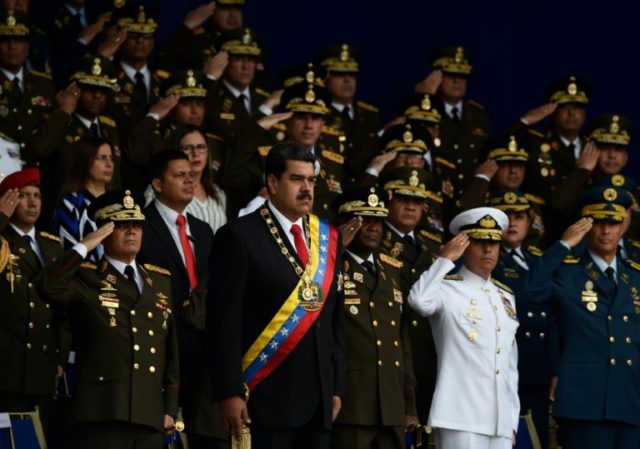Venezuelan Attorney General Tarek William Saab said on Monday that the masterminds of Saturday’s drone assassination attempt against President Nicolas Maduro have been identified and two drone pilots are under arrest.
Saab said police “know the places where they stayed in the days leading to the attack,” and have “identified the people who made the explosives and prepared the weapons and their international links.”
“It was an attempted assassination and an attempted massacre, as the highest rungs of government and military were at the attack site,” said Saab.
Those “international links” will likely be the topic of much conversation in the days ahead, as the Maduro regime has accused Colombia and the United States of complicity in the assassination attempt. Venezuelan expatriates living in Florida working with Maduro’s “far right” opponents have also been blamed.
Maduro repeated his charge on Monday that Colombia was involved in the attack, claiming he has “sufficient evidence of the participation of the outgoing Colombian government of President Juan Manuel Santos” and will soon release the proof.
Saab implied the attack had some connection to the organization created by slain insurgent and former police officer Oscar Perez. Venezuelan officials said of the six people arrested swiftly on Saturday that all have a history of expressing “anti-government sentiment,” two had criminal records, one participated in anti-government protests in 2014, and one was wanted in connection with an attack on a military barracks.
Venezuelan officials said the drone attack plot was planned for at least six months in advance. The official narrative is that two drones were dispatched to kill Maduro while he was speaking onstage at a commemoration of the Venezuelan National Guard, but Communications Minister Jorge Rodriguez told Russian media there were actually three drones involved.
The Arkansas Democrat-Gazette reported ominous pro-government demonstrations in Caracas on Monday, which employees of the Venezuelan government were required to attend:
Pro-government factions mobilized thousands of Venezuelans dressed in red—the color of the ruling socialist party—onto the streets of the capital in a bid to show the country remains united around Maduro.
“This river of red,” Foreign Minister Jorge Arreaza declared as the crowd waved flags and carried posters with Maduro’s image. “It could have been another red running through these streets.”
“They need to pay the penalty Venezuela’s law calls for,” Diosdado Cabello, a high-ranking socialist party leader, told the crowd of thousands. “There won’t be any more forgiveness.”
…
In his rallying speech, Cabello told Venezuelans there is no doubt that the “Colombian oligarchy” and “North American imperialism” were behind Saturday’s attack.
Maduro was supposed to address the rally but did not appear. His absence went unexplained by officials, while his supporters assumed he felt a public appearance would be unsafe.
The concept of political assassinations carried out with commercial drones is causing no small amount of consternation among security professionals around the world. As Bloomberg News pointed out on Tuesday, U.S. laws currently prohibit law enforcement agencies from tracking and disabling drones the way Venezuelan officials claim to have done. Short range jamming devices employed in security arrangements such as the U.S. presidential motorcade might not be able to prevent out-of-control drone bombs from endangering nearby civilians.
Legislation allowing law enforcement to employ more advanced countermeasures and tracking systems is currently making its way through Congress. Bloomberg News also mentions calls for commercial drones to be equipped with mandatory remote identification and tracking technology, although it might be difficult to prevent sophisticated miscreants from disabling or spoofing such systems.
Terrorist organizations gained experience with drone weapons on the battlefields of Syria and Iraq, while drug cartels in Central and South America are already practiced at using unmanned aerial vehicles to interfere with the U.S. Border Patrol and Coast Guard.
At the lower end of the threat spectrum, there is little to prevent attackers buying small UAVs at modest retail prices and piloting them to their targets, and hobbyist hardware is growing increasingly sophisticated. At the high end, a swarm of drones controlled by A.I. software and picking targets with facial recognition technology could become a nearly unstoppable security nightmare in the near future.
Homeland Security officials called drone bombs “a very serious, looming threat that we are currently unprepared to confront.”

COMMENTS
Please let us know if you're having issues with commenting.